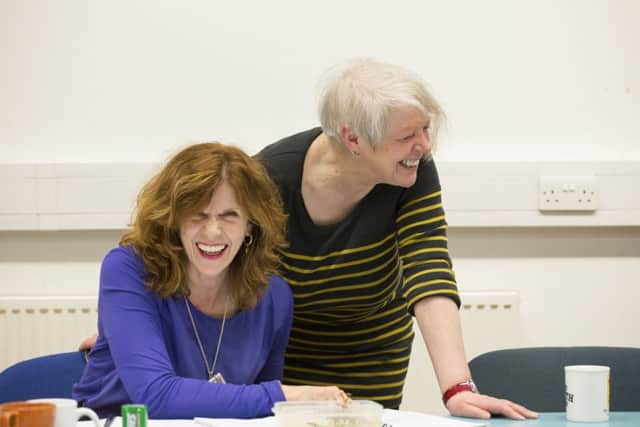Interview: Former makar Liz Lochhead's renewed burst of creativity


Liz Lochhead says she doesn’t mind how mad I make her sound. It’s because she’s just reeled off a list of her literary heroes and declared a passion that goes beyond casual enthusiasm. “I love Euripides, Molière, Lord Byron and Burns just about as much as each other,” she says, “and feel that they’re just as much people that I would talk to.”
Actually, my impression of Lochhead at 68 has nothing to do with madness or talking to dead writers. It’s more to do with a woman in the grip of an artistic obsession. She may have recently completed her five years as Scotland’s makar, having handed over the national-poet reins to Jackie Kay in March, but there has been no let up in her creative output.
Advertisement
Hide AdOfficially, we’re here to talk about Thon Man Molière, the final play of the Royal Lyceum’s 50th anniversary season. But there’s also the small matter of Fugitive Colours, an anthology of her makar-era poetry, not to mention an album recorded with Dundee indie popsters the Hazey Janes (“I can’t sing so I became a jazz speaker”). Oh, and with all that out of the way, she’s going back to her Glasgow School of Art roots to reconnect with her love of drawing.


“It’s about compulsions,” she says in relation to the artistic temperament. “There are these drives that you have. They’re not all tidy or good. If you have plans, your unconscious will take you somewhere else.”
Eighteen months from her 70th birthday, she’s more determined than ever to put her time to creative use. “I’m suddenly at a stage where I think I’ve got to get on with it. I’ve got to get down to some of the things I want to experience before it’s too late – and while my new plastic knee still works.”
Her thinking is shaped by the loss of her husband Tom Logan who died a month after being diagnosed with inoperable pancreatic cancer in 2010. “Favourite Place”, the opening poem in Fugitive Colours, is a heartbreaking tribute to the memory of a man “three months dead” and to their time spent in a caravan near Lochailort on the road to Mallaig. Technically, it’s the only poem about him, but his presence is never far away.
“I didn’t sit down to write about grief,” she says. “I sat down to write a poem about my favourite place. It was no good, so I tore it up and decided to tell the truth about that place. Then it turned out to be a poem that people come up to me and say they were so moved by it.”


Her loss also explains her renewed interest in drawing. “After Tom died, when I couldn’t write at all, I could get lost in drawing. It feels like going back to something from the past, finding out the person that stopped drawing at art school.”
Advertisement
Hide AdThat person was around many years before she was awarded the Queen’s Gold Medal for Poetry after spending five years in the limelight as Scotland’s national poet. “I loved being the makar,” she says. “It was a very good thing for me because I’d just lost my husband and I didn’t know who I was. It was good to be working really hard in all kinds of places.”
She adds: “What I learned was how much poetry matters to people. So many people wanted my services in so many different ways. Although I did a lot, I couldn’t keep up with everything. It was thrilling to know that people still cared enough.”
Advertisement
Hide Ad“Favourite Place” begins a selection called “Love and Grief, Elegies and Promises,” but it would be quite wrong to characterise the anthology as a work of gloom and doom. On the contrary, it is an eclectic mix of the poignant, the quirky and the playful. There are verses for children (“bairnsangs”), celebrations of friends and nods to Robert Burns and Edwin Morgan. Thanks to her role as makar, she has poems about the Scotch Whisky Association and the Royal Incorporation of Architects.
Delighting in language and rhythm, and free with her allusions, she always makes her meaning clear. “I don’t think of poetry as being a way of saying something simple in a complicated way, it’s about saying a big thing in a simple way,” she says. “Good poetry makes sense – not perfect sense and not on a single reading – but it’s not about obfuscating things.”
It’s a philosophy she articulates in “The Theatre Maker’s Credo”, a poem calling for playwrights to tell us “about the people in the play / And what happens next”. Whether as poet or dramatist, Lochhead believes in telling it straight. “Tell the story and make it make sense,” she says.
All of which brings us back to the Royal Lyceum, the very theatre where, exactly 30 years ago, she brought Tom to see one of her plays. “It was the first play of mine that we’d seen together,” she says. “I had just met him and fallen in love with him when I went to the first day of rehearsal.”
The play was Tartuffe, a translation of the comedy by the 17th-century French dramatist Molière. Transposed to Scotland, it was written in what she called “a totally invented, theatrical Scots, full of anachronisms” and struck home all the more forcibly with audiences because of it. She went on to create similarly ribald Scots translations of Molière’s Le Misanthrope, which she turned into Miseryguts, and L’École des femmes, which became Educating Agnes.
Now in Thon Man Molière, she’s turning her attention to the man himself. Starring Siobhan Redmond and Jimmy Chisholm, it’s a backstage comedy about the perils of writing satirical plays – and of dabbling in an unconventional love life. Lochhead saw a connection in the way Woody Allen weathered the storm around his private life and imagined how such scandals would play out in the Paris of Louis XIV.
Advertisement
Hide Ad“This play’s about somebody who’s compelled to do this thing that might get him into a lot of trouble, might prove fatal,” she says. “It’s a black comedy about people who are imbued with that passion to make theatre and it costs them a lot personally.”
• Thon Man Molière, Royal Lyceum, Edinburgh, 20 May until 11 June. Fugitive Colours is published by Polygon later this month.